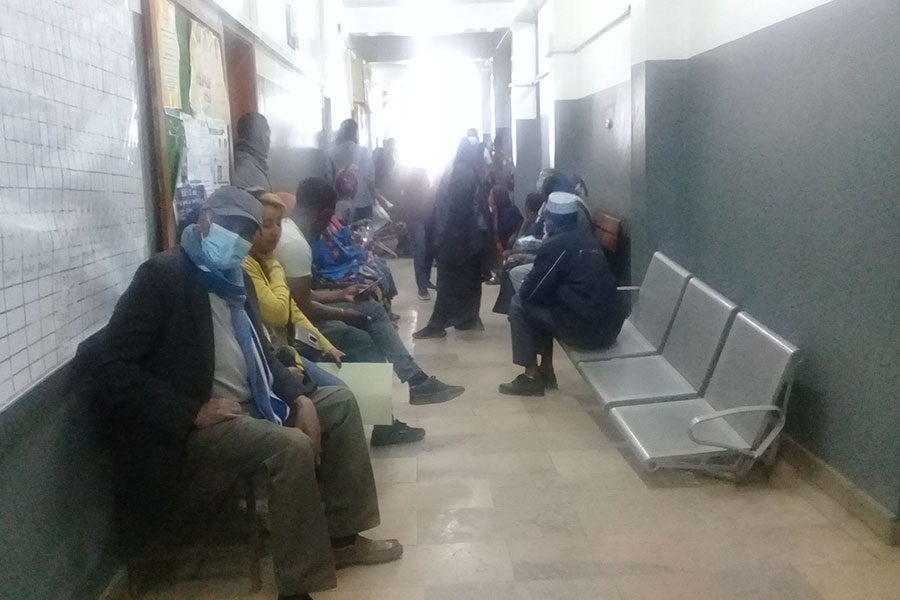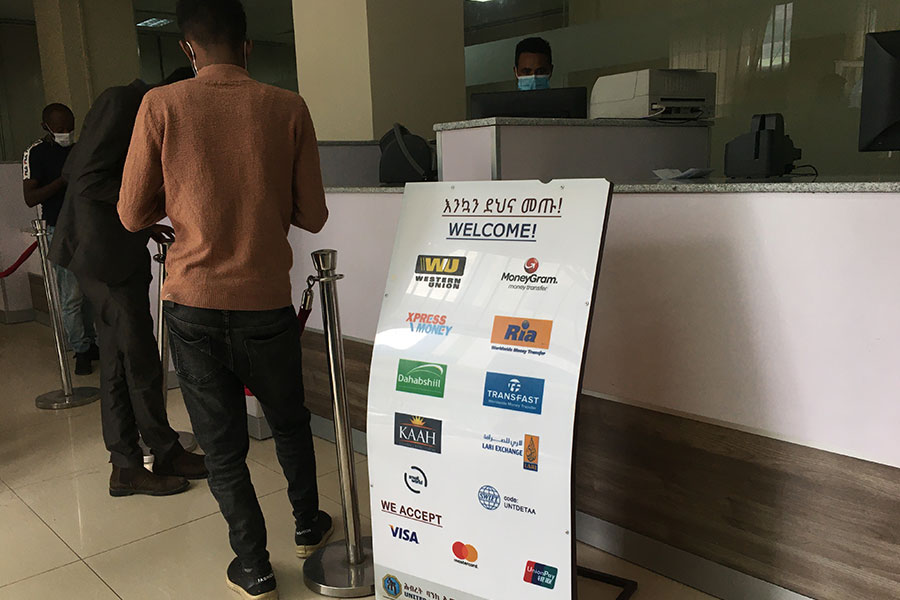
Fortune News | Apr 27,2025
Jan 29 , 2022
By BERSABEH GEBRE ( FORTUNE STAFF WRITER )
Authorities have sent last week a long-overdue bill to the Council of Ministers, which regulates the real estate market, troubled by a series of legal wranglings between developers and disgruntled homebuyers. The authorities hope the bill will be instrumental in reducing disputes that often end up at the courts.
Initiated by the former Ministry of Urban Development & Construction, now the Ministry of Urban Development & Infrastructure, the proclamation has been in the making for the past six years.
The lack of a consolidated legal framework has led to a cascade of legal battles between real estate companies and their customers. Among the issues at the forefront is the timely delivery, or lack thereof, of properties. Funds raised from homebuyers are the principal source of financing for real estate developers. It is standard industry practice for homebuyers to make an upfront payment of 15pc of the property's value upon signing preliminary agreements.
The absence of laws governing project delivery has meant that courts have dealt with hundreds of cases of buyers suing developers over delays, seeking to get their money back or receive compensation.
A series of lawsuits filed against Access Real Estate, incorporated over a decade ago with 34 million Br in equity from close to 650 shareholders, is among the better-known examples. Three years after the company went operational, homebuyers demanded refunds due to delayed handover. Close to 140 homebuyers filed a lawsuit in 2013; the litigation went on for five years before judges at the Federal High Court ordered Access Real Estate and its subsidiary, Pacific Link Ethiopia Real Estate Plc, to pay 88.5 million Br in damages.
According to Arba Beyene, a legal expert who worked at the Yeka District Land Management Bureau for three years, there are times when the existing laws governing the real estate market contradict each other.
Ever since pioneers such as Ayat Real Estate began building and transferring houses two decades ago, the market has largely been governed by the country's commercial and building codes. There are around 270 real estate companies operating in Addis Abeba with a combined registered capital of 5.8 billion Br. Close to 13pc of them are foreign-owned.
The bill proposes to make it mandatory for these developers to deposit upfront payments in a closed bank account. The bill states mechanisms for the disbursement of funds deposited in the closed accounts will be determined by a forthcoming regulation, disclosed Tadesse Kebebew, head of housing development & administration at the Ministry.
Arba welcomes the proposition.
"Putting the funds in a closed account and disbursing them for the intended purposes guarantees homebuyers' investment," he told Fortune.
Industry players say it is difficult to grasp the extent to which developers will be affected by this particular requirement.
Noah Real Estate is an industry giant incorporated in 2013. It taps on its sister company, Great Abyssinia Plc, to finance the initial stages of construction projects though it also receives funds collected from homebuyers and loans from commercial banks. Founded by two brothers, Tewedros and Dawit Zerihun, Noah had delivered 4,500 residential and commercial units by the end of 2020.
“The company requires a downpayment after construction progress reaches at least 50pc,” said Rataneh Fasil, an advisor at Noah Real Estate.
Noah requires homebuyers to shell out payments of up to 15pc of the property's value and settle the balance in six subsequent instalments. However, unlike Noah, many other real estate companies depend heavily on the money collected from buyers and the credit they get from banks. Last year, commercial banks disbursed 28.6 billion Br in loans to the construction and housing sector.
For Habtamu Tekle, general manager of East African Real Estate Development Plc, disbursing money from blocked accounts based on construction progress will not be practical. Incorporated 16 years ago, East African Real Estate Development has thus far transferred 104 units to its customers.
"Loans from banks are not easily attained," he said. "Developers depend on the money collected from buyers."
Limited access to foreign currency affects the timely delivery of housing. Construction requires large volumes of imported materials and equipment, leaving those without access to forex vulnerable to delays. The bill proposes the federal government provide conditional guarantees to and allow the registration of both local and foreign real estate developers capable of long-term international borrowing. The bill allows foreign developers investing in construction input production facilities substituting imports and reinvesting 60pc of the income from the real estate business without repatriating foreign currency for 10 years to engage in the real estate market.
The draft law allows local developers to sell homes before completing construction. It restricts the transfer of title deeds before finishing at least 70pc of the structure and acquiring a landholding certificate for each unit.
“Further clarification about what constitutes 70pc is required,” said Rataneh.
Foreign-owned companies, however, will be required to sell units only after construction is completed. Real estate projects already in progress before enacting the law are not beholden to the proposed rules.
Although the bill does not set capital requirements for local companies, foreign developers will be required to register a threshold capital of 20 million dollars and commit to building at least 10,000 units, 40pc of which must be affordable housing for families with less than three dollars in daily earnings.
“The bill aims to address the housing demand from low-income households,” said Tadesse.
Private real estate companies primarily target high-income homebuyers, while the government focuses on meeting the housing demand from low-income segments of the population. The efforts include constructing 383,000 condominium units over the past 15 years. Yet, a considerable gap remains in the housing market where the needs of the lower-income urban population still have not been met. There is an estimated shortage of 1.2 million housing units in the capital. The government's 10-year growth plan foresees the private sector building around four million units in the coming decade.
Leul Dejene has worked at one of the foreign real estate companies in the capital for seven years. He sees the requirements as discouraging to foreign investments. The capital requirement is much higher than the minimum threshold, 200,000 dollars, set for foreign investors in the law amended two years ago.
The bill also provides alternative options for foreign investors. If they wish to partner with domestic developers, they can ask for proportionate reductions in all of the requirements set for the registration.
The bill attempts to address the land shortage issues faced by developers. Although developers can acquire land in Addis Abeba through allotment and lease auctions, there have been no such auctions in the last three years. Around 77ht of land leased out is under development in the capital.
The draft proposes that real-estate developers that agree to build 10,000 housing units in the capital or 2,000 housing units near industrial parks will receive land based on a direct administrative allocation term lease. Developers who can build and transfer between 1,500 and 10,000 housing units in Addis Abeba or between 500 and 2,000 housing units near industrial parks will be allotted land on special bid lease terms.
Despite the positive changes the bill could bring into the real estate market, Rataneh argues that there should have been more thorough discussions before it was forwarded to the Council of Ministers.
"A lot has changed in the real estate market over the last few years," he said.
Officials dismiss the criticism. Repeated consultative meetings were held two years ago, according to Tadesse.
“No major changes have been made to the draft," he said. "There have been enough consultations."
The bill has introduced complaint and grievance lodging procedures and proposes the formation of a committee to resolve disputes between developers and homebuyers.
PUBLISHED ON
Jan 29,2022 [ VOL
22 , NO
1135]

Fortune News | Apr 27,2025

Radar | Jul 06,2025

Fortune News | Jul 30,2022

Radar | Mar 16,2019

Radar | Sep 02,2023

Agenda | Sep 10,2022

Fortune News | Oct 18,2025

Commentaries | Jan 26,2019

Radar | Jun 03,2023

Agenda | Apr 24,2021

Dec 22 , 2024 . By TIZITA SHEWAFERAW
Charged with transforming colossal state-owned enterprises into modern and competitiv...

Aug 18 , 2024 . By AKSAH ITALO
Although predictable Yonas Zerihun's job in the ride-hailing service is not immune to...

Jul 28 , 2024 . By TIZITA SHEWAFERAW
Unhabitual, perhaps too many, Samuel Gebreyohannes, 38, used to occasionally enjoy a couple of beers at breakfast. However, he recently swit...

Jul 13 , 2024 . By AKSAH ITALO
Investors who rely on tractors, trucks, and field vehicles for commuting, transporting commodities, and f...

Oct 25 , 2025
The regulatory machinery is on overdrive. In only two years, no fewer than 35 new pro...

Oct 18 , 2025
The political establishment, notably the ruling party and its top brass, has become p...

Oct 11 , 2025
Ladislas Farago, a roving Associated Press (AP) correspondent, arrived in Ethiopia in...

Oct 4 , 2025
Eyob Tekalegn (PhD) had been in the Governor's chair for only weeks when, on Septembe...